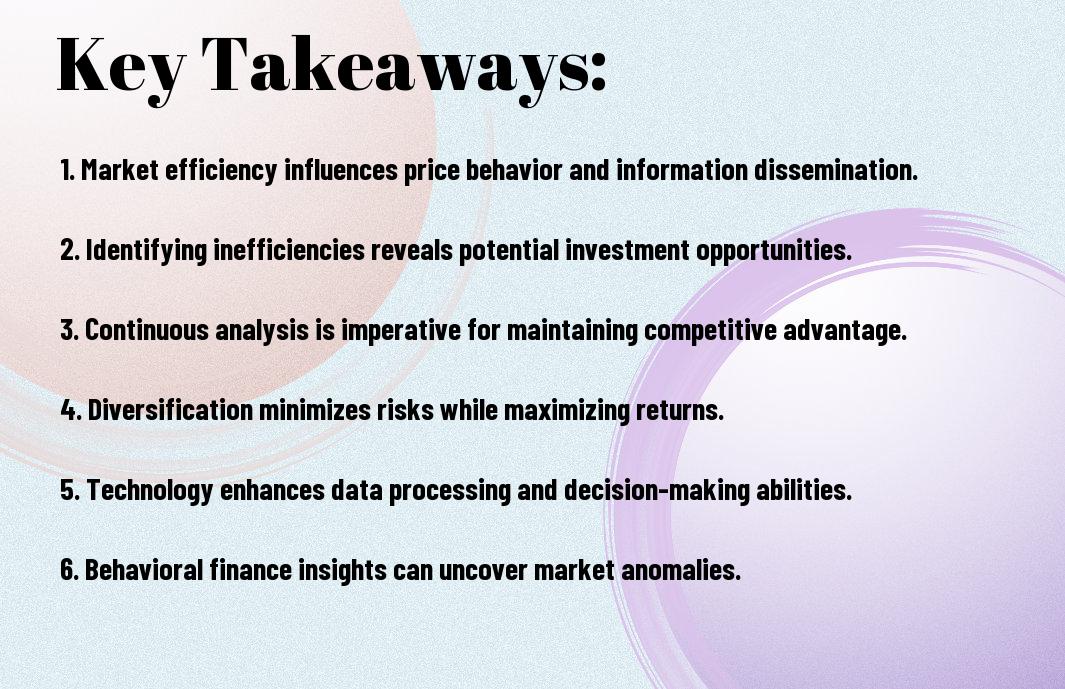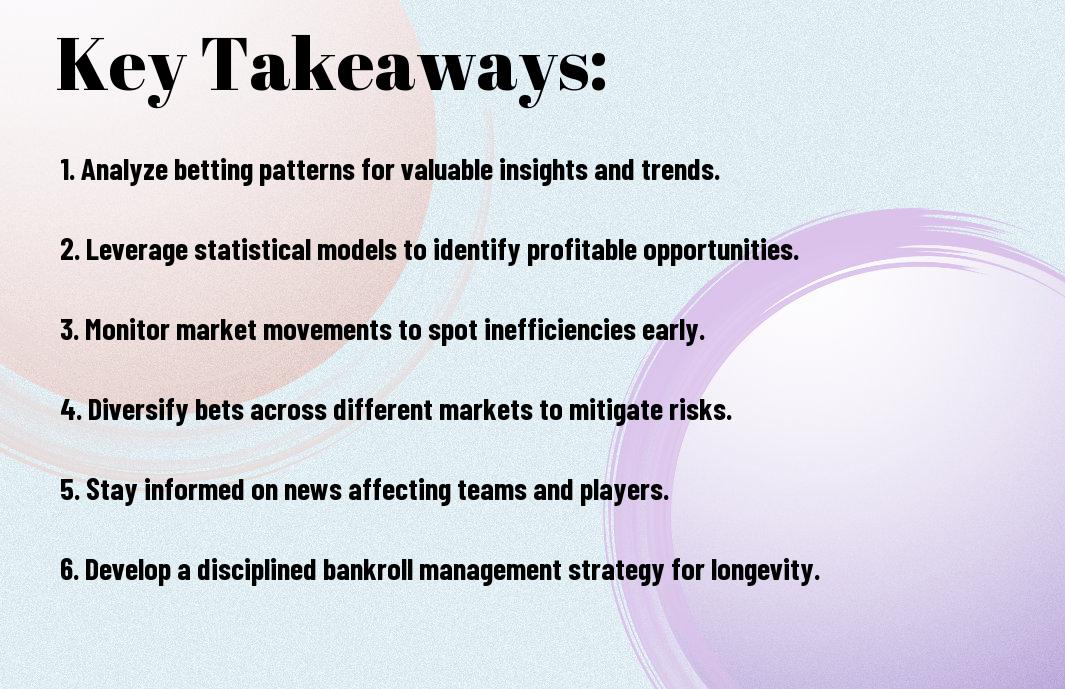As you explore the world of betting, you may wonder if it’s possible to gain an edge in a market that’s increasingly efficient. You’ve likely heard that markets can be unpredictable, but you’re unsure if this unpredictability can be leveraged to your advantage. Your search for answers has led you to question whether market efficiency has eliminated the possibility of making informed, profitable bets. You’re about to discover the truth behind market efficiency and its impact on your betting strategy.

Key Takeaways:
- The concept of market efficiency suggests that it is difficult to consistently achieve returns in excess of the market’s average, as all available information is already reflected in prices, making it challenging to find an edge in betting.
- Efficient market theory proposes that financial markets, including betting markets, are informationally efficient, meaning that prices reflect all publicly available information, making it hard to outperform the market through analysis or forecasting.
- However, some argue that market inefficiencies can still exist, particularly in less liquid or niche markets, where information may not be fully reflected in prices, potentially offering opportunities for those who can identify and capitalize on these inefficiencies.
- The presence of biases and irrational behavior among market participants can also create opportunities for edges, as some individuals may consistently make suboptimal decisions, allowing more informed or disciplined bettors to exploit these mistakes.
- Ultimately, finding an edge in betting requires a deep understanding of the markets, the ability to analyze and interpret data effectively, and a disciplined approach to risk management, as even small advantages can be significant over time with consistent and informed decision-making.
Market Efficiency Fundamentals
The concept of market efficiency is vital to understanding betting markets, and you can learn more about The Role of Market Efficiency in Different Sports Leagues to gain insights into its application. As you examine into market efficiency, you’ll discover how it affects your betting decisions.
Efficient Market Hypothesis in Betting
Effectively, the efficient market hypothesis assumes that market prices reflect all available information, making it challenging for you to find an edge. You’ll need to consider this concept when developing your betting strategy.
Information Processing in Modern Markets
Effortlessly, modern markets process vast amounts of information, making them more efficient. You’ll notice that market prices adjust quickly to new information, affecting your betting opportunities.
Also, as you explore information processing in modern markets, you’ll find that technology plays a significant role in facilitating the rapid dissemination of information, allowing you to make more informed betting decisions. You’ll need to stay up-to-date with the latest developments to stay ahead in the betting market.
Evolution of Betting Markets
You are likely aware that betting markets have undergone significant changes over the years, transforming from traditional brick-and-mortar establishments to online platforms. This shift has had a profound impact on the way you interact with betting markets, offering greater convenience and accessibility.
Traditional vs Digital Platforms
Against the backdrop of technological advancements, digital platforms have emerged as the preferred choice for many bettors, offering a wider range of options and better odds. As you navigate these platforms, you’ll notice the differences in user experience and the variety of betting options available.
Speed of Information Flow
Digitally, information dissemination has become instantaneous, allowing you to stay up-to-date with the latest developments and make informed decisions. This rapid flow of information has significantly impacted your betting strategy, enabling you to react quickly to changing circumstances.
To fully appreciate the impact of the speed of information flow, consider how it affects your ability to analyze data, track trends, and adjust your bets accordingly. As you probe deeper into the world of betting, you’ll discover that having access to timely and accurate information is crucial for making informed decisions and gaining an edge in the market.
Technology Impact on Market Efficiency
All aspects of the betting market have been significantly impacted by technology, leading to increased efficiency and reduced margins for bettors. You can now access vast amounts of data and analysis, making it harder to find an edge.
Algorithm-Based Betting
Effectively, automated betting systems have optimized market prices, making it challenging for you to beat the odds. Your ability to find value is diminished as algorithms quickly adjust prices based on new information.
Real-Time Data Analysis
Besides the speed of data analysis, the accuracy of real-time data has also improved, allowing you to make more informed decisions. Your understanding of the market is enhanced by the instant availability of data, which can be used to your advantage.
RealTime data analysis enables you to react quickly to changing market conditions, giving you a better chance of making profitable bets. You can use this data to identify trends and patterns, helping you to make more accurate predictions and stay ahead of the competition.
Market Inefficiencies
Not all markets are perfectly efficient, and you can still find opportunities to gain an edge. You will encounter various types of inefficiencies that can be exploited to your advantage.
Behavioral Biases
Markedly, market participants’ emotional and psychological biases can lead to inefficiencies, allowing you to make informed decisions and potentially profit from their mistakes.
Structural Gaps
Arguably, an absence of transparency and limited access to information can create structural gaps in the market, which you can capitalize on if you have the right knowledge and tools.
And as you investigate deeper into structural gaps, you will find that they can arise from various factors, such as unequal access to information, differences in trading costs, or limitations in market liquidity, all of which can affect your ability to execute trades efficiently and make a profit, so it’s necessary to understand these gaps and how you can use them to your advantage.

Edge Identification
Keep in mind that identifying an edge in betting markets requires a deep understanding of the underlying factors that influence prices. You need to analyze various data points, including team performance, player injuries, and external factors like weather conditions, to make informed decisions.
Statistical Approaches
Around the clock, you can use statistical models to identify trends and patterns in betting markets, helping you to make more accurate predictions and potentially gain an edge. You can leverage tools like data analytics and machine learning to analyze large datasets and uncover insights that others may have missed.
Value Betting Opportunities
Against the odds, you can still find value betting opportunities by looking for mispriced markets or identifying biases in the betting public’s perception. You should be able to spot these opportunities by analyzing market trends and adjusting your strategy accordingly.
It is crucial to note that value betting opportunities often arise when there is a discrepancy between the market price and your estimated probability of an event occurring. You can capitalize on these discrepancies by placing bets that offer a higher expected value than the market price, potentially leading to long-term profits. You should continuously monitor the markets and adjust your strategy to maximize your chances of success.
Modern Edge Preservation
Now, as you navigate the complex world of betting, you’ll find that maintaining an edge requires adaptability and a deep understanding of market dynamics. Your ability to analyze and adjust to new information will be key to your success.
Specialization Strategies
After developing a solid foundation, you can explore specialization strategies that play to your strengths, allowing you to focus on specific markets or types of bets where you have a higher chance of success.
Market Timing Techniques
With the right approach, you can leverage market timing techniques to make more informed decisions, taking into account factors like team performance, player injuries, and other variables that can impact the outcome of an event.
To further refine your market timing techniques, you’ll need to stay up-to-date with the latest news and trends, analyzing data and adjusting your strategy accordingly, which will enable you to make more accurate predictions and increase your chances of gaining an edge in the market.
To wrap up
Following this exploration of market efficiency and betting, you now understand the complexities of finding an edge. You see that while markets are generally efficient, your ability to analyze and adapt can still yield opportunities. By staying informed and refining your strategies, you can potentially gain an advantage, making informed decisions to maximize your returns in the betting market, tailored to your unique approach and risk tolerance.
FAQ
Q: What is market efficiency in the context of betting, and how does it affect the possibility of gaining an edge?
A: Market efficiency in betting refers to the idea that the prices or odds offered by bookmakers reflect all available information about the outcome of an event. In an efficient market, it is impossible to consistently achieve returns in excess of the market’s average because all relevant information is already incorporated into the prices. However, inefficiencies can exist, particularly in less liquid markets or when new information emerges that hasn’t been fully priced in. These inefficiencies can provide opportunities for bettors to gain an edge if they can identify and capitalize on them before the market adjusts.
Q: How can bettors identify market inefficiencies to gain an edge in betting?
A: Identifying market inefficiencies requires a combination of data analysis, market knowledge, and sometimes, a bit of intuition. Bettors can look for discrepancies in odds across different bookmakers, analyze team or player performance trends that the market may not have fully accounted for, or utilize advanced statistical models to predict outcomes more accurately than the market. Additionally, staying informed about upcoming events, injuries, weather conditions, or other factors that could impact the outcome can help bettors make more informed decisions than the general market. Utilizing tools and services that provide real-time data and analysis can also aid in identifying potential edges.
Q: Is it possible to sustain an edge in betting over the long term, considering the evolving nature of market efficiency?
A: Sustaining an edge in betting over the long term is extremely challenging due to the evolving nature of market efficiency. As more bettors and analysts identify and exploit inefficiencies, these gaps in the market tend to close. Moreover, bookmakers continually update their models and adjust odds based on new information and betting patterns, further reducing the potential for long-term edges. However, through continuous learning, adapting strategies, and focusing on niche areas where less attention and analysis are devoted, it may be possible for some bettors to maintain a competitive edge. This requires a deep understanding of the sports, markets, and betting strategies, as well as the ability to evolve and innovate alongside the market.






